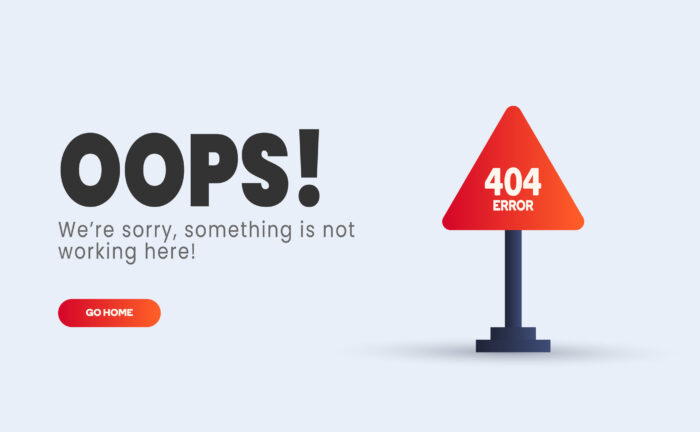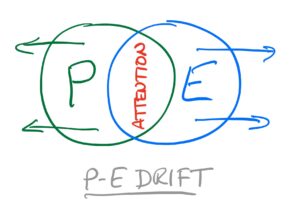
PARALLEL WORLDS 3: Conflicts and Gaps
The Physical and Epistemic worlds (signs, symbols, data, etc.) compete vigorously for that most precious and scarce resource: our attention. Even as I focus to write these words in the E-world, my cat (who seems not to acknowledge such distinctions) is howling for my P-world attention.
P-E conflict in real life
It’s hilarious to observe this P-E conflict in others. Walking the crowded sidewalks of New York City, I often have the experience of walking behind someone at a pretty good clip — then having to step around them when they, suddenly and without warning, make a (P-world) dead stop to attend to an (E-world) phone call or text. Calling and texting while driving have been shown to be as dangerous as driving drunk.
At any given moment, the human mind seems wired to swarm either on the physical — what’s on the road ahead — or on the epistemic — who’s on the phone — but not on both simultaneously. And more than half of us on planet earth carry with us that handy non-stop E-world distraction generator — a smart phone.
Mind the gaps
Sometimes P-E conflicts are merely disconnects. I had made an reservation for a 1pm Valentine’s Day lunch with my partner at a cozy favorite spot nearby. When that morning I received a text prompt from the third-party reservation service, I confirmed. We arrived a little before 1 — to find the door locked and no sign of anyone inside. A few minutes later, a guy in the back noticed us and came out to tell us that the restaurant was preparing to open in two hours, at 3.
Apparently, the reservations system and the restaurant were not communicating. It was no big deal in this case — we had a fine lunch at another place down the block.
But there’s another case I’ve experienced: when using GPS navigation to go north from downtown NYC, a key exit onto the Hutchinson River Parkway is not mentioned by the ‘guide’. This is a much-travelled route — and this bug has been consistently present for years. If you were not adept at reading highway signs at high speeds, you would be seriously misled (literally).
I hear regularly on LinkedIn that I’ve been connected to some of my colleagues for X years — which would be a comforting thought, if I did not know that a few of them have departed the P world permanently some time ago.
Digital natives
Younger people tend to see the P-E divide as not such a big deal. Many of them have learned to fluidly navigate between the two worlds — as fancifully depicted in the film The Matrix. My grandsons are both under ten — and are equally amused by playing the latest Zelda on their Switch as they are playing with a ball in the park. I’ve observed one of them getting a physical ailment (wrist cramp) from playing too long — and E-sports are now a real thing. Their father, my son, strictly limits their time in the E-world.
Back in the 20th century, a typical middle-class teenager longed for access to a car to broaden life’s opportunities. His or her 21st century counterpart longs instead primarily for a smart phone — ironically, for much the same reason. In the 21st century, ‘life’s opportunities’ are increasingly sourced in the E-world, accessible only by digital devices.
P-E inversion
The Epistemic world was developed over millennia in response to the Physical world — as a constellation of signs and signals representing it. But at times, the E-world seems even more compelling and ‘real’ than the P-world. The state of the economy provides a ready illustration. According to Nobel Laureate Robert Shiller, we typically respond more to the E-world narrative about how the economy is doing, than how it actually is doing: “Narratives are human constructs that are mixtures of fact, emotion, human interest, and other extraneous details that form an impression on the human mind.” (Italics added.) He claims, for example, that the Great Depression of the 1930s was exacerbated by the self-fulfilling expectations that it would continue. To some extent, we talked ourselves into that unfortunate outcome.
Human beings seem ‘wired’ to the narrative structure — which turns out to simultaneously be both a feature and a bug of our minds. In extreme cases, the narrative can rival, and even overwhelm, physical reality as a basis for our fundamental beliefs about what is true. We’ll explore this epistemic drift in depth next time.
Reality check
When P-E linkages work, they’re little short of miraculous. So much so that we tend to ignore that epistemic systems, as helpful as they may be, are simulations of — and, at best, approximations of — the physical world.
Each of us is continually bombarded by the epistemic — advertising, texts, phone calls, TV, social media, and so on — it’s taxing for our attention and overall well-being. It’s not hard to get swept away into the E-world entirely — and lose our grounding in the P-world. To guard against this, each of us needs to:
- Stay mindful of the distinctions between the Physical and Epistemic worlds,
- Reconcile the two worlds frequently, and
- Maintain contingency plans and redundancies for when P-E links are broken.
Organizations need to actively maintain healthy P-E linkages, too. There is an entire industry, accounting, whose fundamental purpose is to reconcile the epistemic world of paper and electronic accounts with the physical reality of what those account balances represent — assets, inventories, and so on.
When we take in information — by talking, reading, or watching a video, for example — we’re in the Epistemic world. This can have the effect either of taking us away from the Physical world — or of launching us more deeply into it. In either case, it’s critical to maintain clear distinctions between the online world and the IRL world. And if we do not, what then? In our next episode, we’ll explore the ramifications of blurring our two parallel worlds.
Comments RSS Feed